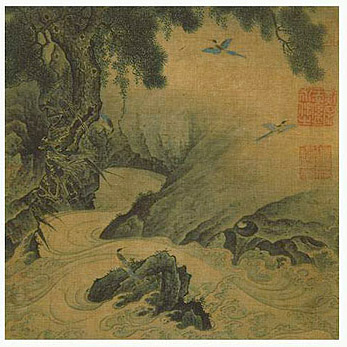Chinese painters, in particular literati painters, would unconsciously draw with the styles of calligraphy. Writing poems became an established way to express their feelings during the process of drawing. In the end, according to the tradition of Chinese literati, red seals with their names engraved were used to sign their works, a tradition that continues to this day.

Actually, Chinese paintings clearly reveal that Chinese think in a holistic way. In other words, before drawing, painters must have an overall planning concerning the content of poems, the style of calligraphy, and the place where the works should be signed. The criterion of "Painting in poetry and poetry in painting" for excellent works was originally set by Sushi (1036-1101), the well-known painter and litterateur in the Northern Song Dynasty(960-1127). Other painters later held this idea in high esteem.
An obvious distinction between Chinese and European paintings lies in the fact that a piece of blank space is always reserved in Chinese paintings for clouds over mountains, fog haunting above rivers, light circles reflected from the sun or the moon, or nothing at all. Some argue that the "blankness" in Chinese paintings is the most appropriate vehicle to convey the uncertainty and ambiguity featured in Chinese poems.
